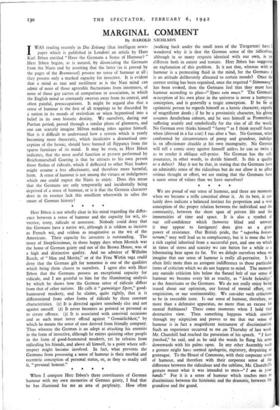When I compare Herr Ibben's three constituents of German humour
with my own memories of German gaiety, I find that he has illumined for me an area of perplexity. How often (walking back under the small trees of the Tiergarten) have I wondered why it is that the German sense of the ridiculous, although in so many respects identical with our own, is ye different both in extent and texture. Herr Ibben has suggested an explanation of this problem. Is it not that, whereas with us humour is a permeating fluid in the mind, for the Germans it is an attitude deliberately allocated to certain moods? Once the correct setting has been organised, once the required "Stimmung" has been evoked, then the Germans feel that they must have humour according to plan—"Spass sein muss." The German's x'nception of his own place in the universe is never a humorous conception, and is generally a tragic conception. If he be an optimistic person he regards himself as a heroic character, capable of magnificent deeds ; if he be a pessimistic character, his gloom assumes Aeschylean colours, and he sees himself as Prometheus suffering acutely and symbolically for the sins of all the world. No German ever thinks himself " funny " as I think myself funny when (dressed in a fur coat) I run after a 'bus. No German, when confronted by circumstances of pomp and grandeur, indulges in an affectionate chuckle at his own incongruity. No German will tell a comic story against himself unless he can so twist it as to render it oblique self-praise. No German has the self- assurance, in other words, to deride himself. Is this a 'quality or a defect? May it not be that, in stating that the Germans have an admirable sense of the ridiculous but do not allow• it to affect serious thought or effort, we are stating that the Germans have a surer sense of values than we have ourselves?
* * * *


























 Previous page
Previous page